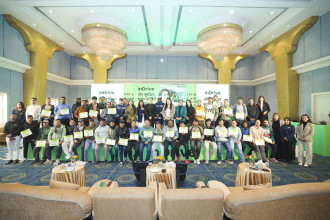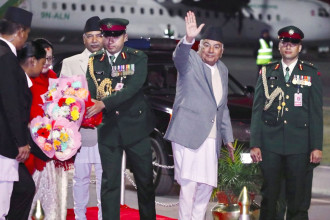-1704790196.jpg)
KATHMANDU: A two-day international conference on trade in South Asia, jointly organised by the World Trade Organization (WTO) Chairs Programme Nepal and Kathmandu University School of Management, concluded in Kathmandu on Monday.
The second day of 'WCP Nepal - AIB South Asia Conference 2024' covered five sessions, starting with a virtual session on 'The Academy of Business Ethics', moderated by Prof S Raghunath, Chair of AIB-SAC Executive Board, Indian Institute of Management, Bangalore, India. The panel included Prof Chuck Kwok, Chairperson of AIB Ethics Policy Committee, University of South Carolina, Columbia, USA.
Two working papers were presented and a paper development workshop was held during the panel discussion on 'Theories and Practices in International Trade: Emerging Scenarios'.
In a discussion, Prof Chuck Kwok from the Ethics Policy Committee, University of South Carolina, and former chairperson of the Academy of International Business (AIB), informed that AIB is connecting international business experts and promoting open borders, global ideas and international culture in globalisation. He also said that AIB is promoting intellectual freedom and inclusiveness in international trade.
-1704790196.jpg)
Likewise, Prof Biju Kumar Thapaliya of Purbanchal University School of Management (PUSOM) said there is a risk of 'deglobalisation' in international trade. He said that there is a weakness in the relations between the countries in international trade and he expressed his opinion that the risk has increased.
Rajendra Singh, Deputy Director of the Trade and Export Promotion Centre, informed that the trade of textiles, which is Nepal's main export item, has improved. He mentioned that textile was the most exported item from Nepal in 2022 and that black cardamom and ginger were other products being exported in large quantities. He said textiles made in Nepal were exported to the USA, Japan, Germany, France and other countries. Moreover, he said Nepal has the potential to export electricity, information technology and water to the international market and could earn up to $500 million.
During the conference, a working paper was presented on the potential of South Asian countries in trade.
Sunanda Ale Sharma made a presentation on the opportunities and challenges of women tourism entrepreneurship in Nepal.
A paper titled 'HCN or PCN? The Subsidiary Perspectives', presented by Jaykumar Padmanabhan, highlighted his key statements, mentioning his research question as 'What is the influence of the subsidiary age and size on the dynamics of the parent country nationals (PCN) and host country nationals (HCN) in terms of their tenure, composition and how do those factors impact the performance of the subsidiary?' He also shared a few of his hypotheses.
Purvi Jhawar, the second presenter, shared her presentation titled ‘The Impact of Political Uncertainty on Initial Public Offerings: Evidence from India’. She stated, “We have discovered that IPOs exhibit higher underpricing during election years and investors show reduced participation in IPOs during these years due to political uncertainty.” She added, “Not much has been studied on the influence of political uncertainty on investors’ decision-making.”
Associate Professor Sabin Bikram Panta, from KUSOM, argued that there was no theoretical justification in the paper. He said, “It would have been better if the justification had been provided. The good part about this paper is that the research gap has been clearly established.”
Suman Sharma, former CEO of Machhapuchchhre Bank and Sunrise Bank, shared that the highlights presented regarding local knowledge were important as top-level management comprises local individuals. He added that the research was useful for banks in Nepal.
Prof Saikat Banerjee of the Indian Institute of Foreign Trade, Kolkata, while giving his speech on the workshop titled ‘Paper Development’, requested respect for every individual involved in research, citing that research is not easy work. “Skills for analysis, critical reading, storytelling, referencing, and selection are very important for a good researcher,” he stressed.
-1704790196.jpg)
The WCP Nepal - AIB South Asia Conference 2024 concluded with the distribution of awards and certificates to all those directly or indirectly involved in the event.
A paper titled ‘How do Product Standards Influence Exports? Empirical Evidence from South Asian Countries’, co-authored by Manash Roy Pradhani, Debashish Chakraborty, and Triptendu Prakash Ghosh, secured the first position. Jaykumar Padmanabhan, with his research on ‘HCN or PCN? The Subsidiary Perspective’, secured the second position.
On the first day, the international conference discussed why South Asian countries were not able to benefit from international trade, and emphasized the need to increase these benefits.




-1770013438.jpeg)

